
Perfume is a Japanese girl group consisting of Nocchi, Kashiyuka and A-chan. The group formed in 2000 in Hiroshima, Japan, before relocating to Tokyo in 2003 and linking a close partnership with producer Yasutaka Nakata, who created a distinct "technopop" identity for the group. Their performances are noted for their choreography and incorporation of technology with futuristic imagery, and Perfume has emerged as one of the most successful Japanese girl groups.
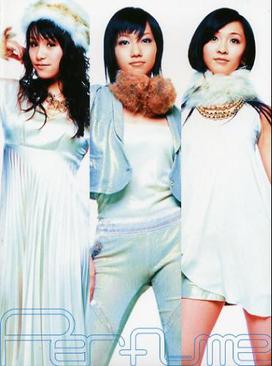
Perfume: Complete Best is the first greatest hits album by Japanese girl group Perfume. It was released on August 2, 2006 by Tokuma Japan Communications. The greatest hits album includes work released from their previous record label Bee-hive Records, and previous work with Tokuma Japan Communications. The album also included b-side and one newly recorded track. It was released in three different formats; a CD and DVD bundle, a digital release, and a double 12-inch vinyl LP. The LP was released through Perfume's February 2016 box set Perfume Complete LP Box, and a singular limited release.
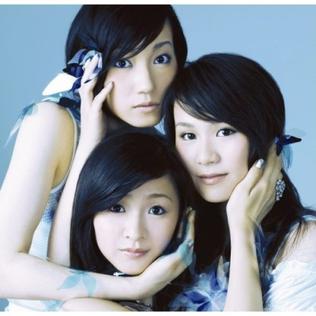
"Polyrhythm" is a song by Perfume, released as the second single from their second album Game and 10th overall, as well as the first track on their third compilation album Love the World. Appropriately, the song's bridge is polyrhythmic, incorporating 5/8, 6/8 in the vocals, common time (4/4) and 3/2 in the drums. Tokuma Japan Communications originally requested for the bridge of the song to be removed for its atypical nature; a concession was reached by including a radio edit known as the "Extra Short Edit" on the single, which removes the bridge while the vocoded backing vocal on the near-end of the song is half-distorted. The song was used for the Kankyō Recycle Campaign by NHK. The single has two editions: a CD only version and CD+DVD version. The only difference between the CD and CD+DVD version is that the CD+DVD version features the music video.

"One" is a song recorded by Japanese recording artist Ami Suzuki for her seventh studio album, Supreme Show (2008). It was written and produced by Japanese producer and Capsule member Yasutaka Nakata. The track is Suzuki's third single with Nakata after her August 2007 single's "Free Free" and "Super Music Maker". "One" premiered on June 18, 2008, as the lead single from the album.

"Can't Stop the Disco" is a song recorded by Japanese recording artist Ami Suzuki for her seventh studio album, Supreme Show (2008). It was written and produced by Japanese producer and Capsule member Yasutaka Nakata. The track is Suzuki's third single with Nakata after her June 2008 single "One". "Can't Stop the Disco" premiered on September 24, 2008, as the second single from the album.

"Dream Fighter" is the 8th major single recorded by Japanese girl group Perfume for their second studio album, Triangle (2009). It was written, composed, arranged and produced by the Japanese musician and Capsule member Yasutaka Nakata. The single included the B-side track, "Negai", of which a remix version appeared on the parent album. It was premiered on November 9, 2008, as the second single from the album in Japan. It was released on June 19, 2013, in European and Oceanic regions, and on June 25 in North America. Musically, "Dream Fighter" is an electropop song, influenced by dance music.

Triangle is the second studio album by Japanese girl group Perfume. It was released on July 8, 2009, through Tokuma Japan. Triangle builds upon the breakthrough success of their previous album Game (2008), with Yasutaka Nakata returning as executive producer.

"Laser Beam" is a song recorded by the Japanese girl group Perfume for their third studio album, JPN (2011). It was written, composed, arranged, and produced by Japanese musician and Capsule member Yasutaka Nakata. The single also included the A-side track "Kasuka na Kaori", which appeared on the parent album. Originally scheduled for an 20 April 2011 release, it was postponed due to the 2011 Tōhoku earthquake and tsunami disaster. As a result, they both premiered on 18 May 2011 as the fourth single from the album in Japan. Musically, "Laser Beam" is an electronic song, influenced by 8-bit music.

JPN is the third studio album by Japanese girl group Perfume, released on November 30, 2011, by Tokuma Japan Communications, nearly two and a half years after their second studio album Triangle. The album sold a total of 268,414 after two weeks of release, making it the 24th best-selling album of 2011 according to Oricon.

"Spice" is a song recorded by Japanese girl group Perfume for their third studio album, JPN (2011). It premiered on November 2, 2011 as the fifth and final single from the album in Japan. It was written, composed, arranged, and produced by Japanese musician and Capsule member Yasutaka Nakata. The single also included the B-side track "Glitter", which appeared on the parent album. It was also released on June 19, 2013 through European and Oceanic regions, and June 25 in North America. Musically, "Spice" is a house song.
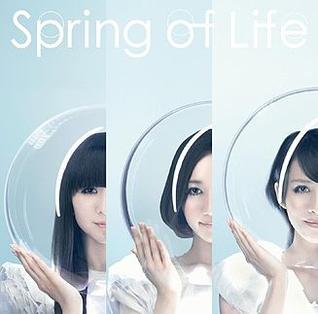
"Spring of Life" is a song by Japanese girl group Perfume from their fourth studio album Level3 (2013). The song was released as the album's lead single on 11 April 2012. It was written, composed and produced by Yasutaka Nakata. The song is a dance track, which features instrumentation from synthesizers and keyboards. "Spring of Life" is the group's first offering after departing from Tokuma Japan Communications and signing with Universal Music Japan.

Love the World is the second compilation album by the Japanese trio Perfume. It was released on September 12, 2012 in Japan under their old label Tokuma Japan Communications, in two editions: CD+DVD and in a regular CD edition.

"Spending All My Time" is a song by Japanese girl group Perfume from their fourth studio album Level3 (2013). The song was released as the album's second single on 15 August 2012. It was written, composed and produced by Yasutaka Nakata. The song is a dance pop track, which features instrumentation from synthesizers and keyboards. It is the group's first English-language single, and their second English effort since their 2008 track, "Take Me, Take Me", from their debut album Game.

"Mirai no Museum" is a song by Japanese girl group Perfume from their fourth studio album Level 3 (2013). The song was released as the album's third single on 27 February 2013. It was written, composed and produced by Yasutaka Nakata. The song is a dance pop track, which features instrumentation from synthesizers and keyboards. The track is translated to "Future Museum" and was used as the theme song for the Doraemon film, Nobita no Himitsu Dougu Museum.
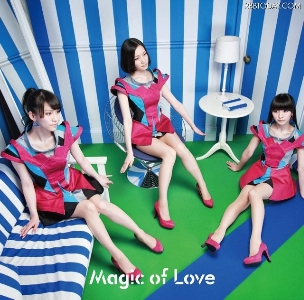
"Magic of Love" is a song by Japanese girl group Perfume from their fourth studio album Level 3 (2013). The song was released as the album's fourth and final single on 22 May 2013. It was written, composed and produced by Yasutaka Nakata. The song is a calm and mellow dance-pop and synthpop track, which features instrumentation of synthesizers and keyboards.

Level3 is the fourth studio album by Japanese girl group Perfume. It was released on October 2, 2013, by Universal J and Perfume Records. Level3 marks Perfume's fourth consecutive album to be fully produced by Japanese producer and Capsule member Yasutaka Nakata, while Perfume contributes to the album as the lead, background vocalists, and executive producers through their self-titled record label. Recorded in Japanese and English language, Level3 is an electronic dance album that borrows numerous musical elements including J-pop, house music, and technopop.

"Computer City" is a song recorded by Japanese girl group Perfume for their first greatest hits compilation, Perfume: Complete Best (2006). It was written, composed, arranged, and produced by Japanese musician and Capsule member Yasutaka Nakata. The single also included the B-side track "Perfume", which appeared on the parent album. It premiered on January 11, 2006 as the second single from the album in Japan. It was also released on June 19, 2013 through European and Oceanic regions, and June 25 in North America. Musically, "Computer City" is a technopop song, influenced by electronic music.
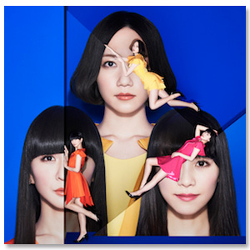
Cosmic Explorer is the fifth studio album by Japanese girl group Perfume. It was released on April 6, 2016 by Universal Music Japan, Universal J, and Perfume Records. It is Perfume's fifth consecutive album to be fully produced, written, composed, and arranged by Japanese musician and Capsule band member Yasutaka Nakata. Five different formats were released to promote the album: a standalone CD, a double CD and DVD/Blu-ray box set, a digital release and a double disc vinyl, where the first disc is blue and the second disc could be orange, pink or yellow. The vinyls were available for purchase at Perfume: A Gallery Experience Supported by Rhizomatiks in London and NY.
"575" is a song recorded by Japanese recording girl group Perfume for their third studio album, JPN (2011). It was written, composed, arranged, and produced by Japanese musician and Capsule member Yasutaka Nakata. The song was included as a B-side track for the group's single, "Voice". It was also released exclusively to Uta stores in Japan on July 14, 2010. Musically, "575" was described as a mellow Japanese pop song. It marks the first time that the group perform in a rap structure, delivered after the first chorus. The song's title, and the structure of its verses, derives from the structure of haiku, a Japanese style of poetry which comprises a 5-syllable line, a 7-syllable line, and then another 5-syllable line.
"Glitter" is a song recorded by Japanese recording girl group Perfume for their third studio album, JPN (2011). It was written, composed, arranged, and produced by Japanese musician and Capsule member Yasutaka Nakata. The song was included as a B-side track for the group's single, "Spice". Musically, "Glitter" was described as a technopop song, influenced by dance music. Two versions were released; the original composition, and the remix that appeared on the parent album. It has appeared as the theme song for one commercial and television series in Japan.



















